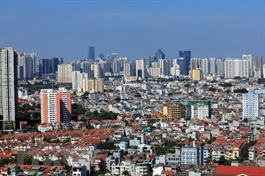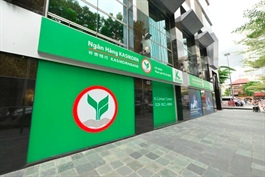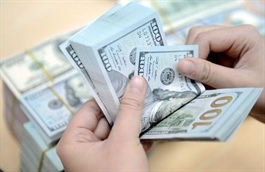Four weak banks to be taken over: central bank
Four weak banks to be taken over: central bank
The State Bank of Viet Nam (SBV) plans to seize four weak commercial banks in a move aimed at strengthening the country's banking system.

A branch office of the Vietnam Construction Bank. — Photo CBB |
The poorly-performing banks are DongA Bank, Vietnam Construction Bank, Ocean Bank and Global Petro Bank, the SBV said in a report submitted to the National Assembly’s Economic Committee at the end of April.
As outlined in the report, three of the banks - Vietnam Construction Bank, Ocean Bank and Global Petro Bank - would be sold by the SVB to stronger commercial banks, including Vietcombank, one of the country's largest commercial banks.
The move is part of SBV’s efforts to improve the local banking system and address bad debts accumulated for the 2021-2025 period, according to the report.
Measures to manage a weak commercial bank placed under “special control” include finding partners to restructure it, rearranging its network of branches, and reducing operation costs to ensure stable operations, the SBV said.
As of the end of 2019, Ocean Bank accumulated a loss of more than VND17.9 trillion (US$763.2 million) and Vietnam Construction Bank more than VND31 trillion ($1.32 billion).
In addition, SBV said it was also restructuring Saigon Joint Stock Commercial Bank (SCB), which has been placed under SBV’s “special control” since last October.
SCB’s operations have become “gradually stable and under control,” according to SBV.
Earlier, Prime Minister Pham Minh Chinh asked SBV to carefully restructure SCB to ensure that the restructuring is transparent and “prevents loss of assets”.
Depositors rushed to SCB branches to withdraw their money last October following the arrest of Van Thinh Phat Group’s chairwoman (who is believed to be the bank’s largest shareholder) for fear the arrest could affect the bank’s operations.
SCB, formed by a merger of three banks in 2012, is the biggest private bank by assets.
Many banks have been placed under “special control” over the years, but all have recovered and developed strongly later.
Non-performing loans
The bad debt ratio of the banking system has increased to 2.91 per cent of total outstanding loans as of the end of February, up from 2 per cent at the end of 2022 and 1.49 per cent at the end of 2021, according to a report by SBV.
Under SBV’s guidelines and regulations, non-performing loans on the balance sheet of commercial banks are controlled below 3 per cent.
The potential bad debts of credit institutions is around 5 per cent, according to a SBV report.
Experts have also warned there is potential bad debt risk from the real estate credit portfolio as the sale of mortgaged real estate is difficult due to the slowdown of the market.
It would be also challenging to find investors with enough funding to buy back large amounts of debt, they said.
There remained problems in legal procedures in handling collateral assets such as real estate, they added.
In a related move, the central bank said in April that it would restructure loans for firms facing challenges, including delaying loan repayments by up to 12 months as part of efforts to speed up the slowing economy. — VNS
Screenshot of a deposit certificate of Vietnam Construction Bank. VNS Photo Bo Xuan Hiep
HCM CITY — The State Bank of Viet Nam (SBV) plans to seize four weak commercial banks in a move aimed at strengthening the country's banking system.
The poorly-performing banks are DongA Bank, Vietnam Construction Bank, Ocean Bank and Global Petro Bank, the SBV said in a report submitted to the National Assembly’s Economic Committee at the end of April.
As outlined in the report, three of the banks - Vietnam Construction Bank, Ocean Bank and Global Petro Bank - would be sold by the SVB to stronger commercial banks, including Vietcombank, one of the country's largest commercial banks.
The move is part of SBV’s efforts to improve the local banking system and address bad debts accumulated for the 2021-2025 period, according to the report.
Measures to manage a weak commercial bank placed under “special control” include finding partners to restructure it, rearranging its network of branches, and reducing operation costs to ensure stable operations, the SBV said.
As of the end of 2019, Ocean Bank accumulated a loss of more than VND17.9 trillion (US$763.2 million) and Vietnam Construction Bank more than VND31 trillion ($1.32 billion).
In addition, SBV said it was also restructuring Saigon Joint Stock Commercial Bank (SCB), which has been placed under SBV’s “special control” since last October.
SCB’s operations have become “gradually stable and under control,” according to SBV.
Earlier, Prime Minister Pham Minh Chinh asked SBV to carefully restructure SCB to ensure that the restructuring is transparent and “prevents loss of assets”.
Depositors rushed to SCB branches to withdraw their money last October following the arrest of Van Thinh Phat Group’s chairwoman (who is believed to be the bank’s largest shareholder) for fear the arrest could affect the bank’s operations.
SCB, formed by a merger of three banks in 2012, is the biggest private bank by assets.
Many banks have been placed under “special control” over the years, but all have recovered and developed strongly later.
Non-performing loans
The bad debt ratio of the banking system has increased to 2.91 per cent of total outstanding loans as of the end of February, up from 2 per cent at the end of 2022 and 1.49 per cent at the end of 2021, according to a report by SBV.
Under SBV’s guidelines and regulations, non-performing loans on the balance sheet of commercial banks are controlled below 3 per cent.
The potential bad debts of credit institutions is around 5 per cent, according to a SBV report.
Experts have also warned there is potential bad debt risk from the real estate credit portfolio as the sale of mortgaged real estate is difficult due to the slowdown of the market.
It would be also challenging to find investors with enough funding to buy back large amounts of debt, they said.
There remained problems in legal procedures in handling collateral assets such as real estate, they added.
In a related move, the central bank said in April that it would restructure loans for firms facing challenges, including delaying loan repayments by up to 12 months as part of efforts to speed up the slowing economy.
























